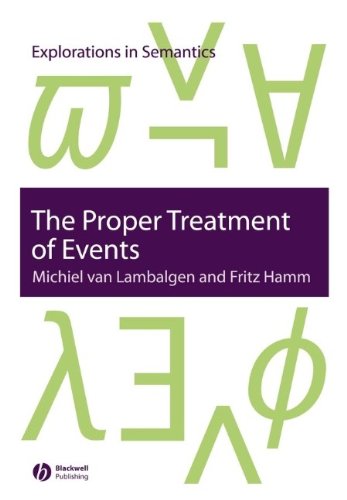Product desciption
The Proper Treatment Of Events Explorations In Semantics Michiel Van Lambalgen by Michiel Van Lambalgen, Fritz Hamm 9781405112130, 1405112131 instant download after payment.
The temporal notions of natural languages are notoriously difficult to analyze. For the tenses of the English language, many different, incompatible approaches have been tried, and the general impression is that things get worse if one looks at the phenomenon of aspect, roughly corresponding to the simple vs. progressive verb forms. One of the most vexing riddles is the so-called "imperfective paradox": If somebody is doing something, we expect, but cannot quite deduce, that that action will be finished. If the chicken is crossing the road, it will normally get to the other side -- but it may be correct to say that the chicken is crossing the road even though a runaway truck (or a falling piano, for that matter) puts an end to that a little later. It seems fair to say that there is no definite theory of the semantics of tense and aspect yet. In their book "The Proper Treatment of Events", Michiel van Lambalgen, a philosopher and cognitive scientist, and Fritz Hamm, a linguist, propose a new theory that, as far as I can tell, does remarkably well. Focussing on the central notion of an event and a corresponding formal notion of an eventuality, the theory uses a computational approach to semantics to explain the meaning of temporal talk. The main slogan here is "the sense of an expression is the algorithm needed to compute its denotation" -- quite a modern, but, as it turns out, fruitful reading of Frege's sense/denotation distinction. Thus the senses of temporal expressions turn out to be constraint logic programs, and the books contains quite a few of them, always in close connection with concrete applications. The wealth of examples provides a welcome balance to the technical details of van Lambalgen and Hamm's theory. The book can be read from a number of different perspectives. For a cognitive scientist, the detailed models of the computational structure of temporal information will be extremely valuable. From a linguistic point of view, there are fresh approaches to many vexing problems of tense and aspect. And last but not least, many philosophical insights are to be gained. The book gives a bold and lucid picture of the phenomenon of temporal perspective. Its most important contribution, though, may be the careful and detailed introduction of computational semantics, applied to one of the most difficult areas of natural language semantics. This book is not an easy read, but it is well written, and technicalities are explained clearly. Judging by the amount of new, interesting and useful information, this has certainly been one of the most rewarding books I have read lately. If you are interested in linguistics, cognitive science, or philosophy of mind and language, this is a book for you.


